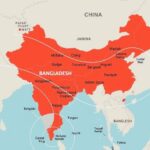Politics
ADVISORY COUNCIL, ASIA, BANGLADESH, BEIJING, BSS, CHINA, DEVELOPMENT PROJECTS, DHAKA, ECONOMIC COOPERATION, GEOPOLITICS, HAINAN, INDIA, INFRASTRUCTURE PROJECTS, INTERNATIONAL RELATIONS, MEXICO, MUHAMMAD YUNUS, NA, NARENDRA MODI, NEW DELHI, NORTH AMERICA, PEKING UNIVERSITY, PKU, SAN, SANJEEV SANYAL, SEVEN SISTERS, TRADE, XI JINPING, XINHUA, YUNUS
Dante Raeburn
Yunus Advocates for Chinese Economic Expansion into Bangladesh, Citing India
Bangladesh’s Chief Adviser Muhammad Yunus has called on China to increase its economic influence in Bangladesh, referencing India’s landlocked northeastern states as potential opportunities. Yunus, during meetings with Chinese officials, secured nine agreements and emphasized strong ties with China for future growth.
During a recent visit to China, Bangladesh’s Chief Adviser Muhammad Yunus urged Beijing to extend its economic influence into Bangladesh. This appeal included a controversial mention of India’s northeastern states, which are landlocked and could present an opportunity for economic partnerships. Yunus remarked that these regions, collectively known as the “seven sisters,” lack direct ocean access and suggested that Bangladesh serves as a crucial gateway for China to these areas.
Yunus emphasized the importance of fostering a good relationship with China, describing it as a “good friend” for Bangladesh. He expressed hope for a new phase in bilateral relations during an interview with China’s state-run Xinhua news agency. He made this statement following meetings with Chinese President Xi Jinping and participation in significant events such as the Boao Forum for Asia annual conference.
During this trip, Yunus and President Xi signed nine agreements, which included a commitment from the Chinese government and companies amounting to USD 2.1 billion in investments, loans, and grants. Bangladesh also invited Chinese participation in local projects, notably the Teesta River Comprehensive Management and Restoration Project. Yunus’s remarks on India’s northeastern states sparked curiosity and criticism from members of the Indian government, questioning the relevance of that commentary in his discussions with China.
In conclusion, Muhammad Yunus’s push for enhanced Chinese economic engagement in Bangladesh has sparked controversy, particularly regarding his reference to India’s landlocked northeastern states. With significant agreements signed during his visit and investment commitments from China, Yunus aims to strengthen bilateral relations, viewing China as an essential ally for Bangladesh’s future economic development.
Original Source: news.abplive.com








Post Comment